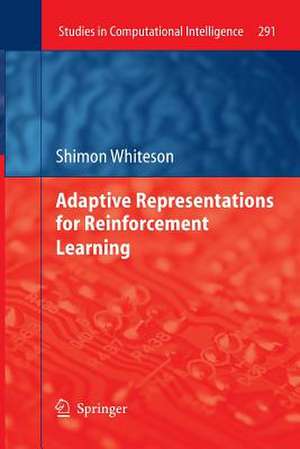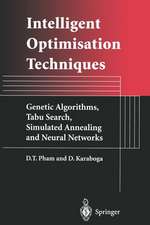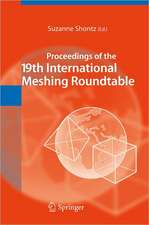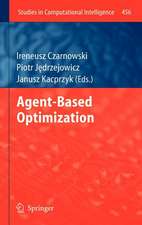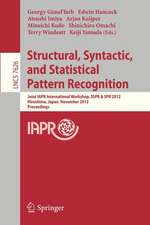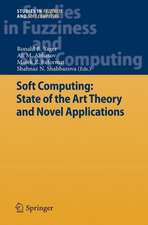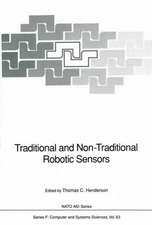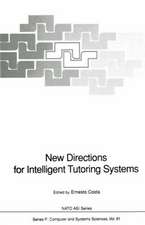Adaptive Representations for Reinforcement Learning: Studies in Computational Intelligence, cartea 291
Autor Shimon Whitesonen Limba Engleză Paperback – 14 noi 2014
| Toate formatele și edițiile | Preț | Express |
|---|---|---|
| Paperback (1) | 637.38 lei 6-8 săpt. | |
| Springer Berlin, Heidelberg – 14 noi 2014 | 637.38 lei 6-8 săpt. | |
| Hardback (1) | 642.65 lei 6-8 săpt. | |
| Springer Berlin, Heidelberg – 5 oct 2010 | 642.65 lei 6-8 săpt. |
Din seria Studies in Computational Intelligence
- 20%
 Preț: 449.37 lei
Preț: 449.37 lei - 20%
 Preț: 1158.26 lei
Preț: 1158.26 lei - 20%
 Preț: 986.66 lei
Preț: 986.66 lei - 20%
 Preț: 1452.76 lei
Preț: 1452.76 lei - 20%
 Preț: 168.78 lei
Preț: 168.78 lei - 18%
 Preț: 1112.30 lei
Preț: 1112.30 lei - 20%
 Preț: 565.38 lei
Preț: 565.38 lei - 20%
 Preț: 649.28 lei
Preț: 649.28 lei - 20%
 Preț: 1047.73 lei
Preț: 1047.73 lei - 20%
 Preț: 1578.96 lei
Preț: 1578.96 lei - 20%
 Preț: 643.50 lei
Preț: 643.50 lei - 20%
 Preț: 657.49 lei
Preț: 657.49 lei - 20%
 Preț: 993.28 lei
Preț: 993.28 lei - 20%
 Preț: 990.80 lei
Preț: 990.80 lei - 20%
 Preț: 989.96 lei
Preț: 989.96 lei - 20%
 Preț: 1165.69 lei
Preț: 1165.69 lei - 20%
 Preț: 1444.52 lei
Preț: 1444.52 lei - 20%
 Preț: 1041.96 lei
Preț: 1041.96 lei - 20%
 Preț: 1047.73 lei
Preț: 1047.73 lei - 20%
 Preț: 1046.06 lei
Preț: 1046.06 lei - 18%
 Preț: 2500.50 lei
Preț: 2500.50 lei - 20%
 Preț: 989.13 lei
Preț: 989.13 lei - 20%
 Preț: 1165.69 lei
Preț: 1165.69 lei - 20%
 Preț: 1164.05 lei
Preț: 1164.05 lei - 20%
 Preț: 1042.79 lei
Preț: 1042.79 lei - 20%
 Preț: 1460.19 lei
Preț: 1460.19 lei - 18%
 Preț: 1403.52 lei
Preț: 1403.52 lei - 18%
 Preț: 1124.92 lei
Preț: 1124.92 lei - 20%
 Preț: 1039.47 lei
Preț: 1039.47 lei - 20%
 Preț: 1008.11 lei
Preț: 1008.11 lei - 20%
 Preț: 1045.25 lei
Preț: 1045.25 lei - 20%
 Preț: 1275.42 lei
Preț: 1275.42 lei - 20%
 Preț: 1040.32 lei
Preț: 1040.32 lei - 20%
 Preț: 988.32 lei
Preț: 988.32 lei - 20%
 Preț: 1169.79 lei
Preț: 1169.79 lei - 20%
 Preț: 1162.37 lei
Preț: 1162.37 lei - 20%
 Preț: 1059.26 lei
Preț: 1059.26 lei - 20%
 Preț: 1164.05 lei
Preț: 1164.05 lei - 20%
 Preț: 1166.52 lei
Preț: 1166.52 lei - 20%
 Preț: 1459.38 lei
Preț: 1459.38 lei - 18%
 Preț: 1005.74 lei
Preț: 1005.74 lei - 20%
 Preț: 997.38 lei
Preț: 997.38 lei - 20%
 Preț: 1055.94 lei
Preț: 1055.94 lei - 20%
 Preț: 1284.47 lei
Preț: 1284.47 lei - 20%
 Preț: 994.08 lei
Preț: 994.08 lei - 20%
 Preț: 1048.72 lei
Preț: 1048.72 lei - 20%
 Preț: 1066.02 lei
Preț: 1066.02 lei - 20%
 Preț: 943.78 lei
Preț: 943.78 lei - 20%
 Preț: 1173.10 lei
Preț: 1173.10 lei - 20%
 Preț: 1457.72 lei
Preț: 1457.72 lei
Preț: 637.38 lei
Preț vechi: 796.73 lei
-20% Nou
Puncte Express: 956
Preț estimativ în valută:
121.98€ • 127.19$ • 101.37£
121.98€ • 127.19$ • 101.37£
Carte tipărită la comandă
Livrare economică 21 martie-04 aprilie
Preluare comenzi: 021 569.72.76
Specificații
ISBN-13: 9783642422317
ISBN-10: 3642422314
Pagini: 132
Ilustrații: XIII, 116 p.
Dimensiuni: 155 x 235 x 7 mm
Greutate: 0.2 kg
Ediția:2010
Editura: Springer Berlin, Heidelberg
Colecția Springer
Seria Studies in Computational Intelligence
Locul publicării:Berlin, Heidelberg, Germany
ISBN-10: 3642422314
Pagini: 132
Ilustrații: XIII, 116 p.
Dimensiuni: 155 x 235 x 7 mm
Greutate: 0.2 kg
Ediția:2010
Editura: Springer Berlin, Heidelberg
Colecția Springer
Seria Studies in Computational Intelligence
Locul publicării:Berlin, Heidelberg, Germany
Public țintă
ResearchCuprins
Part 1 Introduction.- Part 2 Reinforcement Learning.- Part 3 On-Line Evolutionary Computation.- Part 4 Evolutionary Function Approximation.- Part 5 Sample-Efficient Evolutionary Function Approximation.- Part 6 Automatic Feature Selection for Reinforcement Learning.- Part 7 Adaptive Tile Coding.- Part 8 RelatedWork.- Part 9 Conclusion.- Part 10 Statistical Significance.
Textul de pe ultima copertă
This book presents new algorithms for reinforcement learning, a form of machine learning in which an autonomous agent seeks a control policy for a sequential decision task. Since current methods typically rely on manually designed solution representations, agents that automatically adapt their own representations have the potential to dramatically improve performance. This book introduces two novel approaches for automatically discovering high-performing representations. The first approach synthesizes temporal difference methods, the traditional approach to reinforcement learning, with evolutionary methods, which can learn representations for a broad class ofoptimization problems. This synthesis is accomplished by customizing evolutionarymethods to the on-line nature of reinforcement learning and using them to evolve representations for value function approximators.The second approach automatically learns representations based on piecewise-constant approximations of value functions. It begins with coarse representations and gradually refines them during learning, analyzing the current policy and value function to deduce the best refinements. This book also introduces a novel method for devising input representations. This method addresses the feature selection problem by extending an algorithm that evolves the topology and weights of neural networks such that it evolves their inputs too.In addition to introducing these new methods, this book presents extensive empirical results in multiple domains demonstrating that these techniques can substantially improve performance over methodswith manual representations.
Caracteristici
Recent research in Adaptive Representations for Reinforcement Learning Written by leading experts in this field State-of-the Art book
